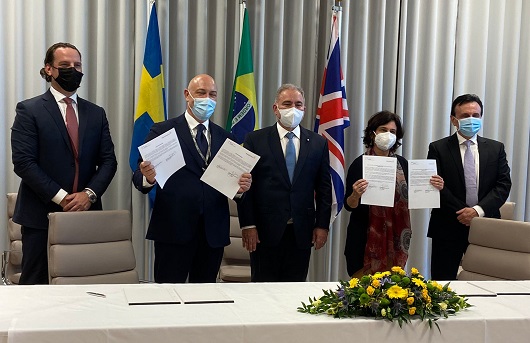Fiocruz and AstraZeneca make a commitment for API acquisition in 2022
03/11/2021
Bio-Manguinhos/Fiocruz and Fiocruz News Agency
Last Thursday (28 October) Fiocruz signed, during a ceremony that took place at the headquarters of AstraZeneca, in Cambridge, United Kingdom, a joint declaration of commitment for the acquisition of Active Pharmaceutical Ingredient (API) with the goal of producing 60 million doses of the COVID-19 vaccine (recombinant) in order to make up the deliveries of the Foundation for 2022. The commitment signed by the institutions aims to guarantee wide availability of vaccine doses for the first semester. With the guarantee of the imported ingredient, Fiocruz will be able to deliver, through the Immunobiological Technology Institute (Bio-Manguinhos/Fiocruz), 120 million doses between January and June next year, of which 60 million with the national API and 60 million with the new agreement.
Queiroga and Nísia (center) during the ceremony in Cambridge (Image: Ministry of Health)
The guaranteed availability of this amount will allow the Ministry of Health (MS), depending on the epidemiological situation of COVID-19 in Brazil until then, to establish different protocols of vaccination and to use the doses to implement booster vaccination whenever it is necessary. The event was attended by the ministry of Health, Marcelo Queiroga; Fiocruz president Nísia Trindade Lima; Global AstraZeneca CEO, Pascal Soriot; and the president of AstraZeneca in Brazil, Carlos Sánchez-Luis.
Mauricio Zuma, director of Bio-Manguinhos/Fiocruz, states that “the new commitment, together with national production, aims to concentrate a higher number of doses in the first semester of 2022, to ensure the possibility of implementing the vaccination strategy deemed necessary by the Ministry of Health when facing the different scenarios the pandemic may present”.
“Fiocruz is attempting to remain one step ahead of possible scenarios of pandemic evolution to meet the demands of the Ministry of Health and of the Brazilian population, and the guarantee of this API early next year will provide us with that flexibility. Today, once again, we rely on the partnership with AstraZeneca, a partnership that has been strengthened and expanding also to the fight against other diseases”, commented the Foundation president, Nísia Trindade Lima.
During the visit, president Lima and the president of AstraZeneca in Brazil also signed a letter of intent to create a future partnership between the British institution and the Drug Technology Institute (Farmanguinhos/Fiocruz) in the fight against diabetes, chronic kidney disease, and heart failure. In the document, the institutions commit to discussing potential activities of technological collaboration and actions to support the preparation or development of studies that can contribute to strengthening the Unified Health System (SUS) in the fight against these conditions.
“Our participation goes way beyond vaccines. It is important to look for partnerships for the education of the population regarding diseases that are now considered endemic, such as diabetes, heart failure, and chronic kidney disease. The role of the industry must expand beyond pharmacological treatment”, states Carlos Sanchez, president of AstraZeneca in Brazil.
National API going through quality tests in the USA
Production of the Fiocruz Active Pharmaceutical Ingredient (API) is ongoing and is now moving on to a new and important phase of the process. Two pre-validation batches of the product manufactured by Fiocruz have been approved in all in-house quality tests and are now on their way to external quality control at USA laboratories. At these laboratories, the samples will go through a complex testing process involving 14 tests in addition to those carried out in Brazil. The longest of these takes 56 days.
This set of tests compare Brazilian and foreign APIs, ensuring that the product manufactured at the Immunobiological Technology Institute (Bio-Manguinhos/Fiocruz) meets the same quality standards and safety of those acquired by means of Technological Order signed with AstraZeneca. Production of the Brazilian API began on 21 July.
The request for vaccine registration alteration is expected to be submitted to the National Agency of Sanitary Surveillance (Anvisa) in November, with the change including the new place of manufacturing of the API. Only after approval by Anvisa will it be possible to transfer national vaccines to the National Immunization Program (PNI) of the Ministry of Health.




